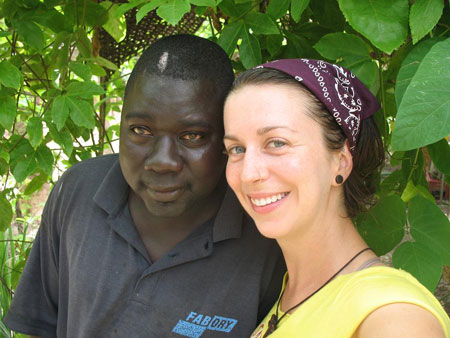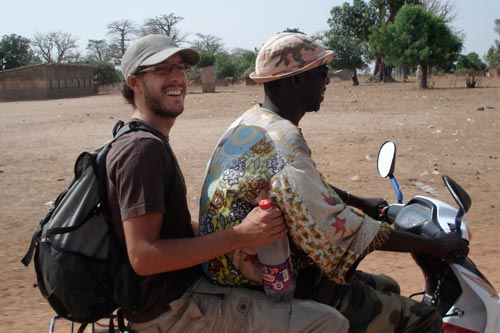 Simon Lavoie, Intern 2010-2011
Simon Lavoie, Intern 2010-2011
Contexte Bio:
Ayant grandi à Lévis sur la rive-sud de la ville de Québec, c’est réellement lors de mes études universitaires de premier cycle que mon intérêt pour les domaines agricoles et agroalimentaires s’est forgé. En effet, ma formation en sciences et technologies des aliments m’aura fait prendre conscience qu’au delà de la disponibilité et de la consommation salubre des produits alimentaires, des dilemmes sociaux et environnementaux se posaient par nécessité au sein de l’"agrosystème" actuel. S’ouvrait ainsi concrètement à moi un champ des possibles complexe et enrichissant…
Cette prise de conscience sommaire m’aura emmené dans la région de Dakar, au Sénégal, où les expériences diverses auxquelles il m’aura été donné de prendre part m’auront entre autres permis de collaborer avec le Directoire national des femmes en élevage (DINFEL) à l’amélioration de la qualité de la transformation du lait local en produits laitiers variés.
Une telle opportunité riche en rencontres exceptionnelles ne pouvait que façonner mes intérêts professionnels futurs. C’est ainsi que les études universitaires de deuxième cycle que je poursuivis furent teintées de passion pour des sujets aussi vastes et complémentaires que l’industrie laitière sénégalaise, la sécurité alimentaire, la souveraineté alimentaire et l’environnement.
Quoi de mieux qu’une autre expérience en sol sénégalais pour participer concrètement a l’application de tels concepts quelque peu abstrait!?! REAP-Canada m’en donnera bientôt la chance…
Formation:
Maîtrise Études Internationales (développement international), Université Laval, QuébecBaccalauréat Sciences et Technologie des aliments, Université Laval, Québec
Host Country:
Sénégal
Expérience de Stage:
''Salamaleykum'' (''que la paix soit avec vous''),
Un stage au sein de l'organisme REAP-Canada constitue une véritable aventure vers l'acquisition de savoir, de sagesse et de compréhension des faits humains et agroenvironnementaux, autant au Québec (Canada) qu'au Sénégal. L'autonomie dont dispose les stagiaires dans la compréhension des éléments constituant leur mandat contribue également à paver la voie sur laquelle le stagiaire, les organisations partenaires et REAP-Canada marcheront pour faciliter l'amélioration des conditions de vie des populations rurales lorsque la sécurité alimentaire, la nutrition et la souveraineté alimentaire sont concernées.
Nul doute, quiconque se trouve du jour au lendemain plongé dans un contexte culturel aussi diversifié et enrichissant que celui qui prévaut au Sénégal verra ses aptitudes personnelles et professionnelles modifiées, perte de repères obligeant. L'hospitalité (''teranga'') légendaire des sénégalais facilite plus que tout l'intégration dans la société, les étrangers intriguant et enthousiasmant la population en générale. La prise de contact est aisée et le réseautage s'en trouve efficacement augmenté.
C'est cette attitude qui prévaut également dans les villages où la collaboration entre REAP-Canada et l'Association pour la Promotion de la Femme Sénégalaise (APROFES) prend réellement forme, où toutes les théories connues peuvent finalement être modelées pour se fondre dans le contexte culturel et ainsi satisfaire les besoins des populations à la base, entre autres les femmes et leurs organisations diverses.
C'est ainsi que mon séjour à Kaolack (ville du bassin arachidier) m'aura permis d'appuyer l'APROFES dans leurs interventions dans les villages de Tchissé Mass et El Hadji Mabaye, situés à quelques kilomètres au sud-est de la ville en question. Les conditions environnementales précaires, l'importance des activités menées par les femmes villageoises et la place centrale qu'occupe l'agriculture pour l'autoconsommation et la génération de revenus auront ainsi motivé les formations en techniques de compostage, fabrication de ''bokashi'' et transformation des aliments (fruits et légumes) qui ont été dispensées pendant les cinq mois de mon séjour.
Après quelques visites dans chacun des villages afin de me familiariser avec les habitants y résidant, d'observer et d'analyser le contexte social et agroenvironnemental prévalant, et d'instaurer le nécessaire lien de confiance, les visites avec les organisateurs communautaires de l'APROFES se sont multipliées. En complément avec des lectures spécifiques venant enrichir le savoir que les paysans m'avaient déjà transmis par la parole et l'action, la portée des actions a réellement pu être accrue, facilitant ainsi l'appropriation de savoir et de connaissance des paysans en matière d'agriculture agroécologique et d'organisation communautaire.
Bien vrai, il ne doit pas être attendu que la productivité si chère aux travailleurs canadiens soient reproduites dans le cadre des activités d'un tel stage. Le partage des savoirs et des acquis doit plutôt être privilégié avec tous les acteurs afin de faciliter l'instauration de processus culturellement appropriés et diversifiés susceptibles d'aboutir éventuellement en résultats concrets et adaptés. Les relations humaines, comme dans toute communauté / société voulant privilégier la paix au détriment de considérations futiles et éphémères, constituent la clé débouchant sur un ''champ des possibles'' susceptibles d'améliorer la qualité de vie des populations rurales. Le positivisme et l'ouverture d'esprit sont primordiales pour réussir un tel mandant de coopération...De toutes les façons, de tel comportement risquent fortement de se développer, le Sénégal étant un pays rayonnant et lumineux.
Sénégal, je te dis ''legui legui'' (''à tout de suite''), DIEUreDIEUf wy (''merci beaucoup'').
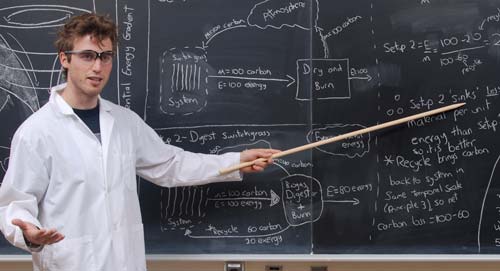 Kyrke Gaudreau, Intern 2011
Kyrke Gaudreau, Intern 2011
Background Bio:
I’m a city boy from Montreal who is starting to discover the beauty and importance of rural living and agriculture. Much of my formal education is technical, and has focused upon energy and water. Recently, I have started moving towards a more qualitative approach to learning and research, as I learn more and more that many of our technical problems have social underpinnings.
Much of my research revolves around the areas of energy and agriculture. I have studied them at the small scale – designing and building a biodiesel plant in Barbados, working on an organic farm – as well as the large scale – working with the Pembina Institute to assess the bioenergy component of the Ontario Integrated Power Systems Plan. At the heart of everything I do, I find that there is serious confusion as to what the goal is of an energy supply system (if there is one) and how we can best reach those goals. To this end, Amory Lovins’ ‘soft energy path’ has always been my guiding light. My personal goal is to better understand how energy use is built into the structure of society.
I hope to make a positive contribution to Senegal. At the same time, I believe it is important to bring my experiences back to Canada. We all need to redefine our relationship with energy and resource consumption, and it needs to start with us younger generations telling a different story than that of our parents. I hope to make Senegal an important chapter for me in this broader story.
Education:
M.Env. – Environment and Resource Studies, Waterloo University
B.Eng. – Civil and Environmental Engineering, McGill University
Host Country:
Senegal
Internship experience:
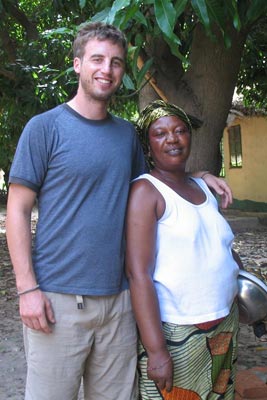 How do you describe a whirlwind of emotions and sensations that result from stepping off a plane and driving directly to Kaolack, the city that I would live in for the next five months, and one so fondly described by the Lonely Planet as “not a place to live the good life”? Most people are more explicit and simply call Kaolack ‘hell’. The sand was everywhere, the dust was blinding, the sun was scorching, the heat was unbearable, and the clock said 9am. It was at this point that I realized there is a subtle difference between knowing full well what you are getting into, and actually appreciating what that means. And yet, five months later when I packed up and left Kaolack for ostensibly the last time, I cried a little bit, probably because of the dust in my eyes. But I knew that coming to Senegal for 5 months was one of the best decisions I could have made.
How do you describe a whirlwind of emotions and sensations that result from stepping off a plane and driving directly to Kaolack, the city that I would live in for the next five months, and one so fondly described by the Lonely Planet as “not a place to live the good life”? Most people are more explicit and simply call Kaolack ‘hell’. The sand was everywhere, the dust was blinding, the sun was scorching, the heat was unbearable, and the clock said 9am. It was at this point that I realized there is a subtle difference between knowing full well what you are getting into, and actually appreciating what that means. And yet, five months later when I packed up and left Kaolack for ostensibly the last time, I cried a little bit, probably because of the dust in my eyes. But I knew that coming to Senegal for 5 months was one of the best decisions I could have made.
In between showing up and leaving was five months of working as a renewable energy intern, with a particular focus on building and improving the Mayon Turbo Stove (MTS). The MTS is one piece in a very complex puzzle of addressing the myriad of interrelated and self-reinforcing social-ecological problems facing Senegal and Gambia, including, but certainly not limited to: drought, deforestation, loss of soil fertility, environmental poverty, and gender equity. By producing and distributing a stove that burns agricultural residues, which for many reasons are often considered a waste product, the hope is that forest pressure, indoor air pollution, and the amount of time spent by women and children collecting fuelwood can all be reduced. The MTS cannot solve every problem facing Senegal and Gambia, and may even exacerbate other problems (such as valorising the removal of residues from farmland) if not properly used. But on the whole I believe it is a positive step forward and can fit into many niche markets of both countries.
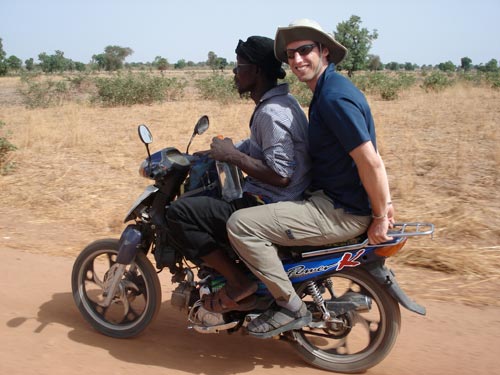 As a REAP intern, the bulk of my work was on the managerial, relational, aspects the stove system, and included liaising between the workshop where the stoves are produced in Kaolack, and our Gambian partner that ultimately distributes the stoves to the project villages, as well as ensuring our workers in Kaolack were on board with the project and were making us a priority. Relational work is challenging at times because you are managing stoves only indirectly, and can easily set things back by culturally misstepping, something that is remarkably easy to do when you have grown up in a society where tradition and culture have to some extent gone the way of the Dodo. At the same time relational work is incredibly important, because so much development work is about fostering positive relationships. As luck would have it, I believe I managed to strengthen the relationship between our various partners in a manner that will ideally improve project outcomes. I also made some incredible friends, and learned some wonderful things, along the way.
As a REAP intern, the bulk of my work was on the managerial, relational, aspects the stove system, and included liaising between the workshop where the stoves are produced in Kaolack, and our Gambian partner that ultimately distributes the stoves to the project villages, as well as ensuring our workers in Kaolack were on board with the project and were making us a priority. Relational work is challenging at times because you are managing stoves only indirectly, and can easily set things back by culturally misstepping, something that is remarkably easy to do when you have grown up in a society where tradition and culture have to some extent gone the way of the Dodo. At the same time relational work is incredibly important, because so much development work is about fostering positive relationships. As luck would have it, I believe I managed to strengthen the relationship between our various partners in a manner that will ideally improve project outcomes. I also made some incredible friends, and learned some wonderful things, along the way.
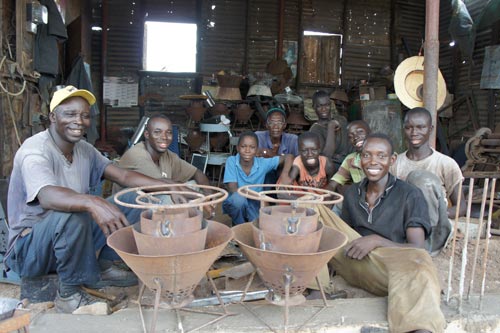
Of course, I took every opportunity to get out in the gardens with Simon, and burn whatever I could in the MTS with Thomas in The Gambia. I discovered that watching peanut shells glow when they gasify is perhaps one of the most wonderful things life has to offer; although my camera was unfortunately never able to truly capture the moment. We even managed to develop a prototype version of the MTS that was faster than a speeding bullet, more powerful than a locomotive, and able to leap tall buildings in a single bound; and literally knocked the socks off the current version of the MTS. The engineer in me was delighted.
While I write this, I recognize it is still too early for me to distil all the lessons I have taken home with me. Perhaps the long-term learning and personal change are exactly what matter most about CIDA internships. I know I have taken a part of Kaolack and Senegal home with me (including in the form of parasites and other ‘friends’), and it will hopefully help me as we navigate an uncertain and exciting future.
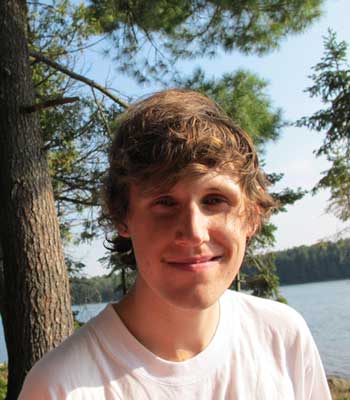 Thomas Blaine, Intern 2011
Thomas Blaine, Intern 2011
Background Bio:
I grew up in Ottawa, a city which offers many of the comforts of a large city while being small enough to leave easily. This allowed me to explore the Gatineau Hills which offer great hiking and biking in the summer and, I would argue, the best cross-country skiing in Canada during the winter. I was also introduced to the pleasures of international travel early in my life. Together these experiences helped foster a love of exploration and a strong sense of curiosity in me.
In high school I always enjoyed science and math and decided to study engineering. I chose the University of Toronto’s Engineering Science program in part because I appreciated the chance it offered to do a general course of study before choosing a specialty aftver second year and because of its reputation as a challenging program.
In the end I decided to enter the Energy Systems option. This was a broad option which discussed both the generation (from both the electrical and mechanical perspectives) and the transmission of energy. Largely through independent reading, I also began to develop an interest in the effect that our energy use is having on our environment and the role that energy use plays in the developing world.
Education:
B.A.Sc. Engineering Science, Energy Systems, University of TorontoHost Country:
The Gambia
Internship Experience:
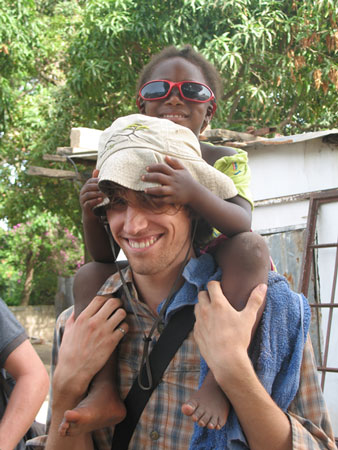 Only now, when I look back, can I realize how unrealistic my expectations for my internship were. My flight landed in The Gambia’s capital, Banjul, which I imagine to be similar to Senegal’s capital, Dakar. Specifically I imagined paved roads and skyscrapers. Yet, when I arrived and I looked around at my new surroundings, I was surprised that in many areas the streetlights weren’t working, the roads were in poor condition, there were animals wandering around everywhere and there wasn’t a glassy tower in sight!
Only now, when I look back, can I realize how unrealistic my expectations for my internship were. My flight landed in The Gambia’s capital, Banjul, which I imagine to be similar to Senegal’s capital, Dakar. Specifically I imagined paved roads and skyscrapers. Yet, when I arrived and I looked around at my new surroundings, I was surprised that in many areas the streetlights weren’t working, the roads were in poor condition, there were animals wandering around everywhere and there wasn’t a glassy tower in sight!
I quickly got over my initial reservations though, in large part thanks to Babukar Jallow, my language teacher. As I was the only student, lessons were not very structured and, in addition to working on my Olof skills, we talked about international development, Gambian politics, the intricacies of English grammar, and how to enjoy life. This isn’t to say that I wasn’t interested in the language itself. It’s the first non-European language I’ve learned and it feels and sounds quite different. It also has some wonderful sayings. Having now returned home, I still find various Olof proverbs floating to the surface of my mind when the situation is right.
More generally Babukar came to symbolize the generosity and dedication of most Gambians. People would go out of their way to ensure that I found my way home when I was lost, there was always someone willing to help me out with a new project, and there was always someone who wanted you to come and eat with them. The lack of social reservation, the willingness to interact with and help others, is something that I hope to be able to bring back to Canada with me.
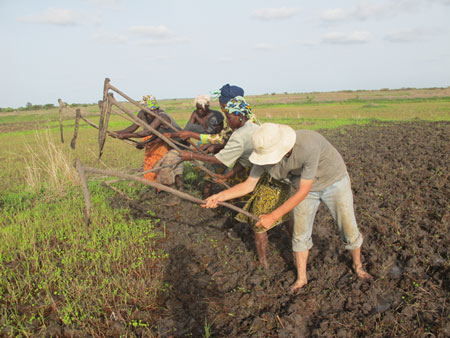
The first night there wasn’t any power at my hotel and so the night guard took me to my room by the light of his cell phone screen. This apparent contrast between high tech tools in a low tech environment seemed to be present throughout the Senegambia region, especially in the rural villages. For instance, walking around Njawara, I was sometimes reminded of illustrations from children’s books set in the Medieval Ages. The effect was ruined when I would spot a solar panel on top of a pole, a person playing music from his cell phone, or, at the center where I worked, by the presence of laptops and patchy internet. The effect was almost magical – there were days when I just couldn’t quite believe that it was all possible. It brought home in a very real way the concept that it is possible for one country to leap frog another. This left me with exciting new ideas about what a ‘developed’ country could look like and how development can be achieved.
Although I had been warned by previous interns, and read on countless blogs, that internships like these rarely go as planned, I was still surprised by the twists and turns my internship took. While my original workplan had focused on working with improved cookstoves, my mandate quickly expanded to working on improved rice farming equipment, helping with the planning of a new workshop, and serving as a technical assistant. The key in many of these roles was forming connections with local experts who were able to provide advice and insights that I probably would never have arrived at on my own.
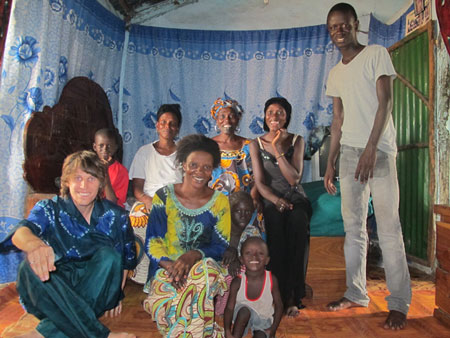
The cookstove program was being subjected to a review process when I arrived. This meant that I went out and asked users how they felt about the current stove design and looked at other designs that were being used in the area. Generally I found that people were happy with their MTS stoves although cost and access to fuel sources were still barriers in some areas. I also had the opportunity to explore some new design ideas. The effectiveness of these designs will be evaluated by future interns.
In the end, to ensure work related satisfaction, it was important to approach everything that came along with an open mind and lots of energy: regardless of whether it was expected or not. Along the way I had the opportunity to help set up a new solar pumping system, evaluate the demands for a village wide solar system, and help NATC, my host organization, apply for new funding.
Together the experience has given me new insights into what the concept of a developed country and what the process of development can and do mean. It has given me new ideas of how change can occur and what progress can look like. It has also helped me to develop personally. Perhaps most importantly, I’ve begun to understand a new concept of time. I’ve been given a new appreciation of what can happen when you allow unknowns to intrude into schedules and when you make the time to stop and talk to the people around you.
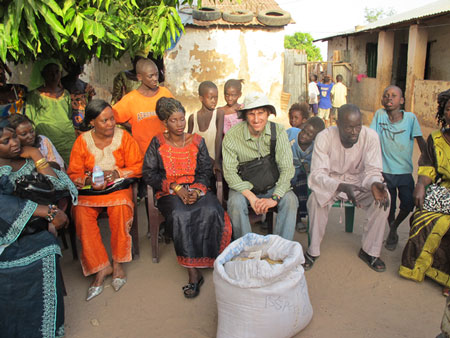
Danielle Denis-Lalonde, Ecological Agriculture Development Intern 2011
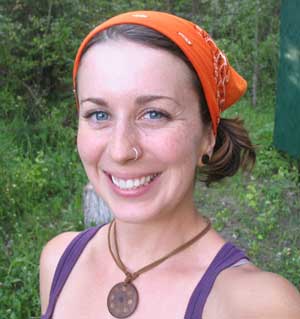 Background Bio:
Background Bio:
How does an accountant from Calgary wind up being an ecological agriculture intern with REAP-Canada? From an early age, it was clear that I was one of those people who is happiest outdoors. Every year, my parents took me to the family farm in Saskatchewan where I immersed myself in the freedom, activity and simplicity of rural life. My cousins and I explored the old barns, climbed the combines and got lost in the fields, pausing only to fill our bellies with raspberries from my grandmother’s garden. Growing up in Calgary, I found my escape from city life in the backcountry trails of the spectacular Rocky Mountains.
However, this love of nature didn’t translate into a career direction until much later. After obtaining my Bachelor of Commerce and Chartered Accountant designation, I found myself bored with boardrooms and looking for more fulfilling work. I started traveling and volunteering abroad, developing a greater understanding of the world and of myself. My reputation as an environmentalist opened unexpected doors and I found myself managing the environmental sustainability program for the health care system in Alberta. Although I enjoyed this work, I craved more hands-on experience so I volunteered on farms in BC and took courses in organic agriculture. Not sure what to do next, I kept an eye out for ways in which I could combine my love of “playing in the dirt” with my desire to make the world a better place. REAP-Canada’s internship opportunity fit the bill perfectly!
As I prepare to head to West Africa, my hope is that my unique skill set and my willingness to learn will help drive positive and sustainable change in rural Senegambian communities.
Education:
B.Comm. – Haskayne School of Business, University of CalgaryHost Country:
The Gambia
Internship Experience:
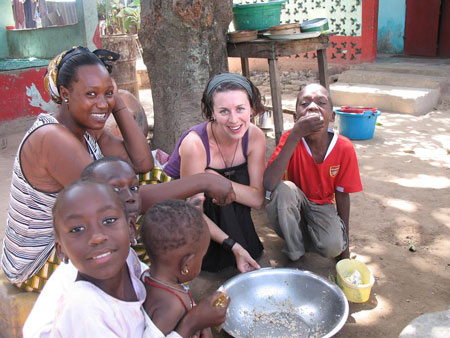 As with many other interns before me, I struggle to capture my internship experience in a mere paragraph or two. I feel like I could write a novel on the comedies of cultural immersion, on the challenges and triumphs of working in international development, and on the personal growth that is the inevitable result of such brief but intense experiences. And if I were to actually write that novel, it would begin with a very long list of heartfelt acknowledgments and words of gratitude: Thank you to REAP-Canada for taking a chance on an “Accountant from the Big City” and granting me the opportunity of a lifetime, to CIDA for funding such immensely beneficial internships, to my family and friends who supported me throughout the highs and lows of life abroad, and of course, to the people of Njawara and throughout The Gambia, who welcomed me into their villages, their kitchens, their gardens and their hearts.
As with many other interns before me, I struggle to capture my internship experience in a mere paragraph or two. I feel like I could write a novel on the comedies of cultural immersion, on the challenges and triumphs of working in international development, and on the personal growth that is the inevitable result of such brief but intense experiences. And if I were to actually write that novel, it would begin with a very long list of heartfelt acknowledgments and words of gratitude: Thank you to REAP-Canada for taking a chance on an “Accountant from the Big City” and granting me the opportunity of a lifetime, to CIDA for funding such immensely beneficial internships, to my family and friends who supported me throughout the highs and lows of life abroad, and of course, to the people of Njawara and throughout The Gambia, who welcomed me into their villages, their kitchens, their gardens and their hearts.
It probably goes without saying that each intern is profoundly changed by the experience of living and working abroad. I'm certainly no exception. Not only did I go crashing through my comfort zone like a bull in a china shop, I was also completely awed and humbled by the hospitality, patience and acceptance granted to me by the people of West Africa. Whether I was assisting in farmer training sessions, transplanting rice alongside women twice my age, teaching computer literacy skills to eager pupils, or pouring over financial data in the “office” under the mango trees, the sense of cooperation and community was truly inspiring. My culturally informed tendencies towards high-productivity and quick results were soon blended with a more African outlook, which values processes and relationships above all else.
I can now see that successful international development isn't just about improving the physical quality of life, nor it is just about providing financial assistance either. To really elevate the well-being of others and stimulate positive lasting change, it is necessary to build trust and understanding amongst people. How can we expect to work well together, and achieve our goals, without a foundation of mutual respect? Although this seems obvious and simple enough, my internship experiences taught me that this is in fact the crux of the international development “challenge”. It's much easier to arrive full of ideas and enthusiasm, and jump right into implementation, than it is to sit back and listen, really listen.
I now believe that all great change begins by really listening; by becoming fully aware of how things actually are. For how can we determine what next step to take if we don't know where we currently stand? That is probably the greatest lesson Gambia has taught me, along with a healthy dose of APPRECIATION (one definitely worthy of capital letters). I now have a much deeper appreciation for how others live, for the blessings in my life, for the interconnectedness of all living things, and for the humanity in us all. These are lessons I will carry with me forever. Thank you, Jerejef!
